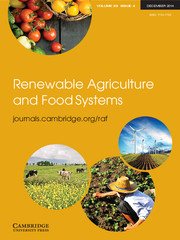Article contents
Organic and conventional Washington State farmers' opinions on GM crops and marketing strategies
Published online by Cambridge University Press: 04 July 2007
Abstract
A 1999 United States Department of Agriculture (USDA) policy on organic certification excluded the use of genetically modified (GM) crops. The decision remains controversial because it provokes debate over the fundamental meaning of organic agriculture. Some scholars, farmers and activists claim that organic agriculture represents a value orientation that is opposed to trends in industrial agriculture, of which GM crops are the latest product. Because organic farmers are a significant constituency in this debate, we examined their values and practices related to marketing, environment and GM crops. From a survey of 1181 Washington State farmers, we created a sub-sample of 598 crop farmers (fruits, vegetables and grains), of which 109 described themselves as organic (certified organic, moving towards organic certification and non-certified organic), and we analyzed organic and conventional farmer responses to a number of issues to discern comparative commitment to self-seeking economic interests. Results reveal differences among conventional and organic farmers on GM crops and several marketing and environmental values and practices, suggesting that there is some validity to portraying organic agriculture as an alternative vision to industrial agriculture.
- Type
- Research Article
- Information
- Copyright
- Copyright © Cambridge University Press 2007
References
- 8
- Cited by


